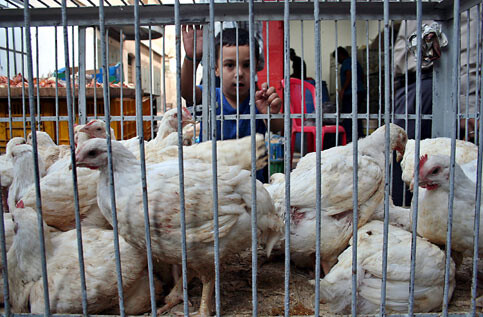United Nations Relief and Works Agency for Palestine Refugees in the Near East 12 April 2006

As of 10th April 2006, the total number of birds culled and buried in the Gaza Strip was 339,986. The projected number of birds to be culled within the 3km radius of each outbreak is 500,000. (MAANnews/Wesam Saleh)
GAZA - John Ging, Director of UNRWA’s Gaza Field Office, highlighted that “a compensation package is urgently needed for the hundreds of families whose livelihoods have been wiped out by bird flu.”
Mr. Ging visited Juhr El-Deik Municipality, at the invitation of the Mayor, to meet with refugee farmers whose chickens have been culled due to recent outbreaks of avian influenza within the Gaza Strip. The culls were ordered and carried out by the Palestinian Ministry of Health.
Commenting on the cooperation of the farmers, Mr. Ging said that he was “impressed with their sense of civic duty. Everyone acknowledged that, notwithstanding the economic devastation visited on them and their families, culling was essential given the public health considerations.”
However, the farmers are aggrieved that, although they had agreed so readily to cooperate with the culling, a move that wiped out their livelihood, no one has yet provided them with compensation.
Mr. Ging has emphasized that, without this vital component, the emergency response plan is fundamentally undermined as the public have no incentive to notify suspected cases to the ministry, thereby increasing the public health risks.
UNRWA has been involved at every stage in the UN-wide programme to contain and deal with the avian influenza epidemic. The Agency has met with other UN departments, including the World Health Organisation, and 50,000 leaflets have been disseminated to the refugee population through UNRWA clinics. Mr. Ging said that this had been key to preventing any sense of panic amongst refugee community.
UNRWA staff are also maintaining a state of alert in the rest of the occupied territory. According to Dr. Husam Siam, Chief of the West Bank Field Health Programme, “West Bank sanitation personnel are monitoring the situation within UNRWA camps, but currently our priority is Gaza”.
As of 10th April 2006, the total number of birds culled and buried in the Gaza Strip was 339,986. The projected number of birds to be culled within the 3km radius of each outbreak is 500,000.
Related Links